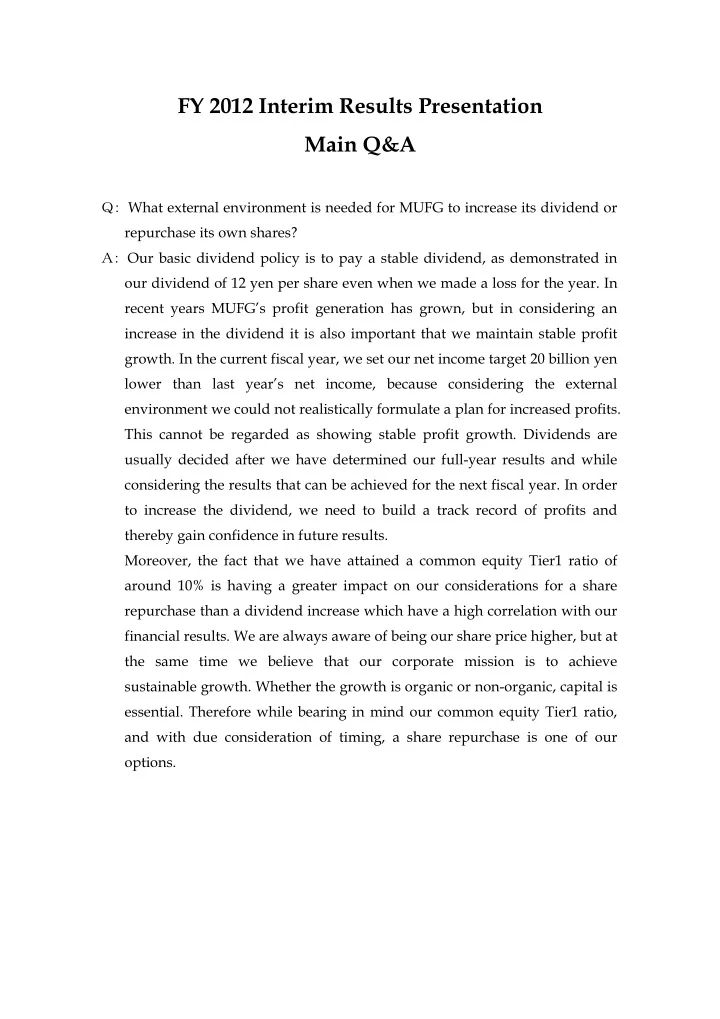

FY 2012 Interim Results Presentation Main Q&A Q: What external environment is needed for MUFG to increase its dividend or repurchase its own shares? A: Our basic dividend policy is to pay a stable dividend, as demonstrated in our dividend of 12 yen per share even when we made a loss for the year. In recent years MUFG’s profit generation has grown, but in considering an increase in the dividend it is also important that we maintain stable profit growth. In the current fiscal year, we set our net income target 20 billion yen lower than last year’s net income, because considering the external environment we could not realistically formulate a plan for increased profits. This cannot be regarded as showing stable profit growth. Dividends are usually decided after we have determined our full-year results and while considering the results that can be achieved for the next fiscal year. In order to increase the dividend, we need to build a track record of profits and thereby gain confidence in future results. Moreover, the fact that we have attained a common equity Tier1 ratio of around 10% is having a greater impact on our considerations for a share repurchase than a dividend increase which have a high correlation with our financial results. We are always aware of being our share price higher, but at the same time we believe that our corporate mission is to achieve sustainable growth. Whether the growth is organic or non-organic, capital is essential. Therefore while bearing in mind our common equity Tier1 ratio, and with due consideration of timing, a share repurchase is one of our options.
Q: The spread on domestic corporate lending is declining. Is this for large companies or SMEs? Also, what is your outlook for housing loan interest rates? A: Overall, the environmental is tough. Borrowers have the advantage in the present environment with strong competition in loans for large companies, SMEs and home buyers. Our sales divisions are working hard to prevent declines but domestic spreads are not expected to increase for some time, as downward pressure is expected to continue. However, in overseas markets, loans with higher spreads are increasing, partly because rival western banks are shrinking their assets. Q: My impression is that MUFG’s domestic customer divisions are facing a severe environment with no relief in sight soon. In this environment how will you grow revenues for your Global business segment and Global Markets segment and how will you achieve your medium-term business plan targets? A : From the start, we planned for a tough environment for domestic businesses this year. Despite this challenging environment, each segment is working hard, and in the first half of FY 2012 the Corporate segment performed ahead of plan. Considering the difficult conditions in Japan, our profit drivers are overseas strategy, sales & trading business and cooperation with Morgan Stanley, etc. and in these areas we see some positive signs. The trading gains on government bonds in the Global Markets segment stood out, while the sales & trading business was meeting the high targets we had set. In regions with relatively large economies, the Global business segment and Global Markets segment are moving forward in co-managing offices, which has led to increased earnings in sales & trading. We are continuing to provide basic products that meet our customers’ needs, such as interest rate and forex hedges, while increasing the lineup of services we can offer through cooperation with Morgan Stanley. Also, Morgan Stanley itself and our two domestic securities joint ventures with Morgan Stanley are performing well. Cooperation between BTMU and MUSHD has also increased over the past year. While profits
from this collaboration will take time to reach our targets, we are getting a good response so far. Q: With the possibility of a new administration taking power in Japan, what is your policy on portfolio management of Japanese government bonds over the next year or so? A: We are managing our JGB holdings cautiously and with a sense of concern over the medium- to long-term. We hold a range of discussions on our portfolio on daily, weekly, monthly, quarterly and annual bases. While we may alter our policy at a certain time in response to changes in the environment, such a change seems unlikely during the next year. Over the short-term, we do not intend to make any major change in policy.
Recommend
More recommend